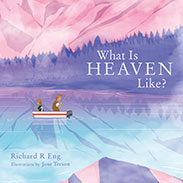
 |
Jesse is six, happily accompanying his father on a fishing trip. The two begin talking about Heaven because Jesse heard a bit about it in his Sunday School class. His father readily takes up the subject and offers some of his own suggestions about the nature of Heaven, such as that there will be "no bad things" there. He compares earthly consciousness to what fishes see underwater, compared to the clarity experienced when they leap out of the pond. He surprises Jesse by saying there will be work to do in Heaven—not like the chores that Jesse doesn't enjoy, but work such as Adam and Eve had in the Garden of Eden, which will be joyful. In fact, everything that happens in Heaven will be enlightening and engaging.
Jesse happily pulls out his first fish when he feels a nudge on his fishing hook. Dad uses this example, saying that the nudging sensation is like what Jesse is feeling now, asking about Heaven—"pointing to something better and something greater." By the end of their outing, Jesse anticipates being in Heaven someday.
Author Eng is a family minister whose story creation example is based on C.S. Lewis' works. The name Jesse was given to an unborn child lost to a miscarriage, and the tale offers genuine hope for all children as they contemplate life's great mysteries. The narrative is illustrated vividly by Jose Tecson, who brings the two characters to credible form and interaction. Eng's "Parent Discussion Guide" follows the story, helpfully presenting questions that parents can answer for themselves and then pose to their children as, like Jesse and his father, they examine together the possibilities for happiness, music, work, and great beauty that God has created and planned for humanity.
RECOMMENDED by the US Review